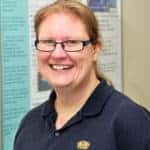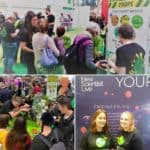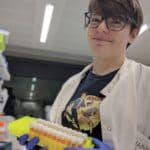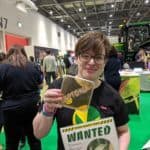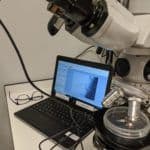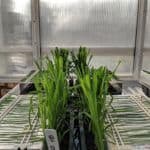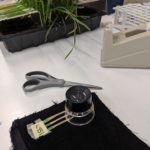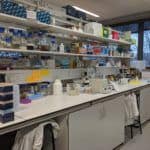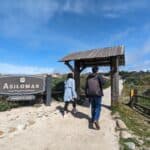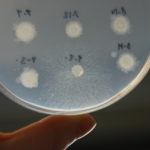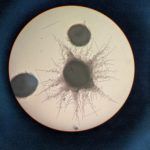Profile
Hannah Blyth
-
About Me:
I am a plant pathologist (I look at wheat🌾 with a particular fungal disease🍄) working as a postdoctoral research scientist at Rothamsted Research👩🔬. When I’m not working, I like to hang out with my friends or work on my hobbies 🧗♀️🏊♀️🪡🖌️🎮.
-
Read more
Hello, my name is Hannah.
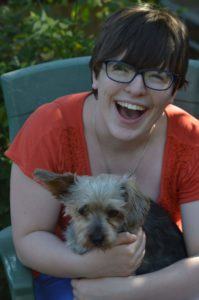
I live in Harpenden with four housemates; if I could have pets where I live, I would love to have a dog.
I have a degree in Biology and a PhD in Plant Pathology, and I’m now working as a research scientist at Rothamsted Research!
When I’m not working I like to spend time with my friends or on my hobbies! I recently started practising watercolour painting🖌️ and swimming! But I also love stargazing🌠, climbing🧗♀️, baking🧁, photography📸 and I spend too much time listening to podcasts, watching YouTube/Twitch or playing video games🎮.
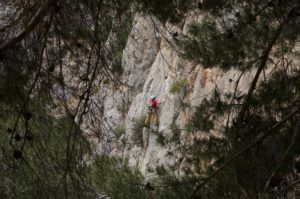
-
My pronouns are:
My pronouns are she/her.
-
My Work:
I study a fungus (Zymoseptoria tritici, or Zymo) that causes disease to wheat! For my research, I am attempting to understand how the fungus and wheat might respond to climate change by working with the fungal and wheat genomes.
-
Read more
Plant Science and Agricultural research are so important for our future. While I now think plants are fascinating, I found the school curriculum a little boring. Before University, I hadn’t even considered how plants can get sick!
I work with a microbe known as Zymoseptoria tritici, but I like to call it Zymo for short. Zymo is a fungus that causes disease only on wheat leaves and results in the loss of up to 50% yield. Farmers do not stan this fungus.
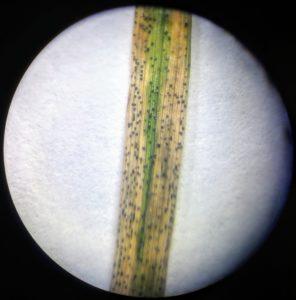
Zymoseptoria UV mutants on a wheat leaf.
It has been roughly calculated that efforts to control this disease account for 70% of the EU’s pesticide use (specifically fungicides – chemicals that kill fungi!).
Similar to how bacteria become resistant to many antibiotics, fungi like Zymo can become resistant to many pesticides. Zymo has been shown to resist all the pesticides we throw at it!
My project is important because I am learning how Zymo and wheat respond to each other under high-temperature stress. Combining climate change models, Zymo genetics, and wheat resistance!
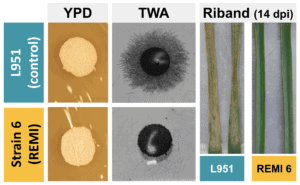
The pink coloured spots are how Zymo grows on HIGH nutrients, you can see the normal growth (on top) and the mutant (below) look the same! The second spot pictures show how Zymo grows on LOW nutrients – it forms finger-like projections called hyphae… but not our mutant! The pictures of the leaves show that the mutant is unable to cause disease! For more pictures of my work see the gallery below!
-
My Typical Day:
No two days are the same but… I get up, get dressed, eat some breakfast and check my calendar before a five-minute walk to work! I am very fortunate to live very close to the laboratory where I work. Once at work I start my day by making a cup of tea and make my to-do list for the day at my desk. A day in the laboratory starts with trying to remember which set of hooks I left my lab coat on then check my to-do list. Check on my plants, do they need watering? Check on my fungus, is it growing well?
-
Read more
07:00 till 08:30 – wake up and get ready for work.
08:50 – Head to work.
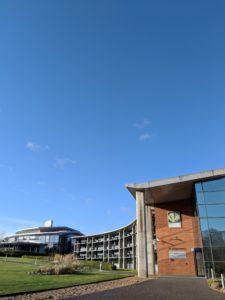
This is Rothamsted Research!
09:00 – Get to my desk and switch my computer on. Make a cup of tea and check my emails. I like to make sure my laboratory notebook is up to date and make a to-do list that I can carry around with me for the day. If ever anyone needs to find me they can almost just follow the fluorescent orange sticky notes.
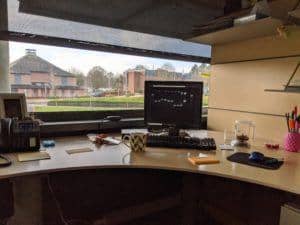
My desk, lovely view but it does get a bit cold in the winter!
09:30 – Check on my agar plates (how well are my microbes growing) and my plants (haircut time or water?) Sometimes my plants are grown in the greenhouses (when I need more space), but I often grow them on the window ledge in the laboratory! The wheat plants need three weeks to grow before I put Zymo (the fungus) on and after that another 10-21 days!
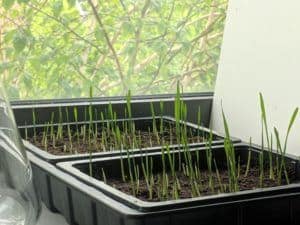
Baby wheat plants growing on the laboratory window ledge.
10:00 till 12:30 – A lot can happen during this time. If I need equipment sterilising or media (agar plates, broths…) in preparation for the next day/week this when I like to do it. Friday mornings at this time every fortnight or so my supervisor and I will meet to discuss how things are going and what I’ve got planned for the coming weeks.
When I have some fungus out on special agar plates or on plants, if they’re ready for photos I might get (some of) that done during this time. Sometimes when I am transforming Zymo’s DNA I won’t get to leave the laboratory for lunch until 13:30!
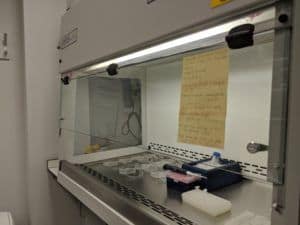
Transformation Tuesday! In this photo, I have mixed together Zymo and special bacteria, called Agrobacterium tumefaciens, that enables me to alter Zymo’s DNA. You can see I was using yellow sticky notes at the time…
12:30 ~ 13:30 – I tend to take a long lunch ‘break’ (unless my to-do list for the day is very long). Sometimes, I catch up with my colleagues. Other times, I draft emails to send later or spend time on more creative projects.
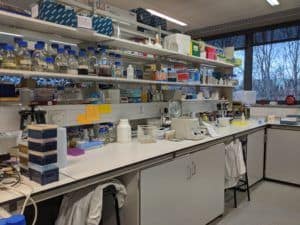
This is the lab where I work, can you spot my sticky notes?
14:00 till 17:00 – Again, it depends on what needs doing. If all my lab work is done, I might work from my desk for a bit, get confused by bioinformatics, or get frustrated with some presentation slides. If I need to swap scenery, I can sit in a space called ‘The Hub’ for a while or walk around Rothamsted Farm.
-
What I'd do with the prize money:
If I won the prize money, I would use it to enhance our science communication tools and design an engaging ‘Fungi and Food Security’ workshop. I want to develop interactive props like 3D models of fungi and disease progression visuals, hands-on activities such as spore printing and microscopy, and educational talks on the global impact of fungal pathogens on crops. The funds would cover developing these materials and enable outreach to schools and communities. By making fungal science accessible and exciting, I hope to inspire future scientists while raising awareness about sustainable solutions to combat food insecurity.
-
Education:
I started at a local primary school but left aged 8 and went to St. John’s College Cardiff, where I stayed to do my GCSEs and A-levels. I was at that school until I was 20-years-old!
I ended up one year behind when I joined my new school, to catch up on my Maths skills, and needed an extra year to finish my A-level studies. Life throws you curve balls, and sometimes things just take a bit more time.
-
Qualifications:
Achieved eight A grades at GCSE including Astronomy, Physics, Maths and French, and A* grades in Spanish, English Literature, Biology and History.
For my A-level studies, I chose Biology (A), Chemistry (A*) and History (A), and AS-levels in Mathematics and Physics (both C).
At University I earned a 2:1 in my undergraduate Masters in Biology (MSci, Hons).
Then, I completed a PhD with the University of Nottingham and Rothamsted Research as part of a Biotechnology and Biological Sciences Doctoral Training Programme.
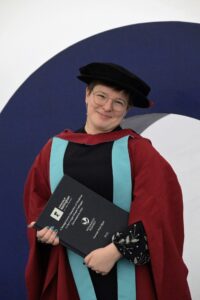
#PhDone
-
Work History:
Worked (while submitting the final copy of my thesis) for Gowan (an agricultural solutions company) immediately following my PhD, testing three different herbicides’ impacts on the lipid profiles of a notorious agricultural weed, blackgrass. I then worked as a postdoctoral researcher with another group at Rothamsted to help tie up some loose ends in a project involving Arabidopsis thaliana (a plant model species) and the ‘BIG’ mutant response to iron deficiency. Now, I work as a postdoctoral researcher on a project that combines the skills I learned from my PhD and those short-term jobs!
Before University, I volunteered at a Sunday School and later a Nursing Home while completing my GCSEs and A-levels. I also did a Nuffield Research Bursary placement in Astronomy!
-
Current Job:
Post-doctoral researcher at Rothamsted Research!
-
Employer:
Rothamsted Research is a world-leading research centre with a proud history of ground-breaking discoveries in agricultural science since its founding in 1843. At our Harpenden site (Hertfordshire), we have two of the world’s oldest continuous agronomic experiments (Broadbalk, which began in 1843; Park Grass, which started in 1856). In North Wyke (Devonshire) we have a unique national and global research facility that is linked to real-world farming: The North Wyke Farm Platform (to learn more, here is a YouTube video).
-
My Interview
-
How would you describe yourself in 3 words?
thinking about food
What did you want to be after you left school?
Medical Doctor or a Detective.
Were you ever in trouble at school?
Nothing serious, though I definitely did rush some homework in the mornings.
Who is your favourite singer or band?
Depends on my mood, but I really love the band Yellowcard or Michael Bublé.
What's your favourite food?
Apple pie or Rhubarb crumble 🥧(especially with custard)
If you had 3 wishes for yourself what would they be? - be honest!
I would wish for a very slightly longer arm span (more reach for climbing). To be tolerant to lactose again (I miss eating cheese sandwiches). Being able to slow down time spent with friends and having fun (spend more time with them).
Tell us a joke.
I'm sorry I don't have any good jokes... I'm not much of a FUN-GAL (fungi, fungus, fungal... I'll leave 😂)
-





